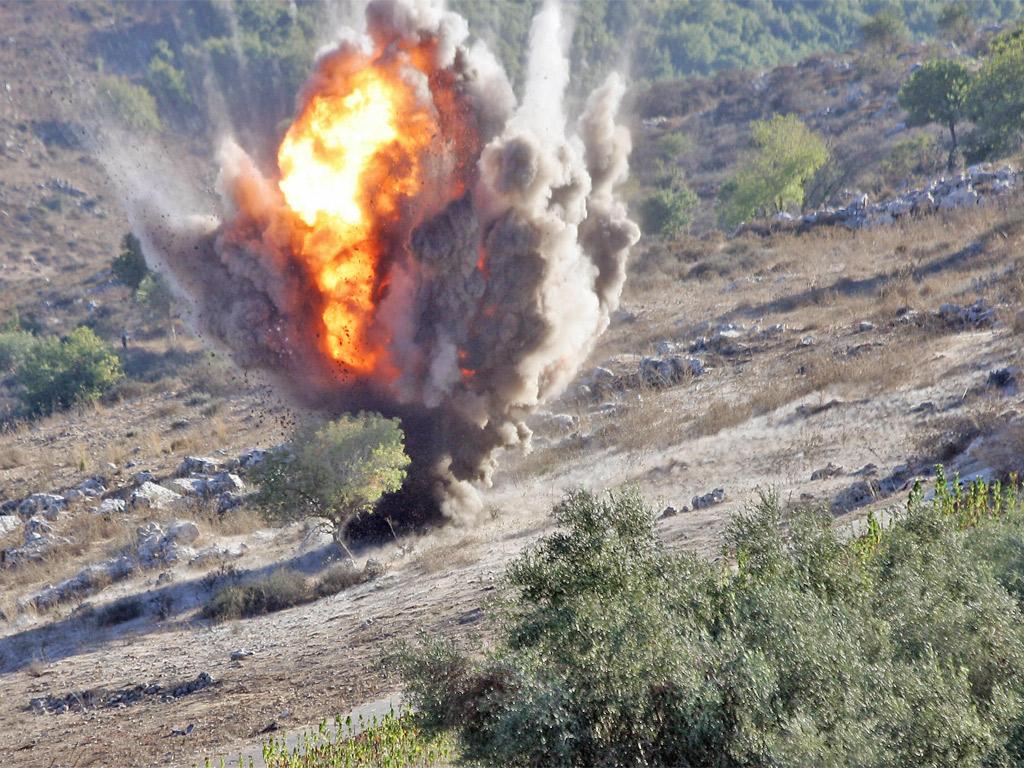US indefinitely shelves plan to ban 'indiscriminate and frequently defective' cluster bombs
Pentagon had planned to stop using older types of cluster munitions, blamed for high civilian death tolls, at the end of 2018

Your support helps us to tell the story
From reproductive rights to climate change to Big Tech, The Independent is on the ground when the story is developing. Whether it's investigating the financials of Elon Musk's pro-Trump PAC or producing our latest documentary, 'The A Word', which shines a light on the American women fighting for reproductive rights, we know how important it is to parse out the facts from the messaging.
At such a critical moment in US history, we need reporters on the ground. Your donation allows us to keep sending journalists to speak to both sides of the story.
The Independent is trusted by Americans across the entire political spectrum. And unlike many other quality news outlets, we choose not to lock Americans out of our reporting and analysis with paywalls. We believe quality journalism should be available to everyone, paid for by those who can afford it.
Your support makes all the difference.The US military is to indefinitely delay a ban on the use of frequently defective types of cluster bombs that had been due to come into force at the end of next year.
The Pentagon said safety improvements in munitions technology had failed to advance enough to replace older stockpiles of the explosives, which opponents say kill civilians indiscriminately.
Cluster bombs, dropped by air or fired by artillery, scatter bomblets across a wide area but sometimes fail to explode and are difficult to locate and remove. They can lead to civilian deaths and injuries long after conflicts end.
More than 100 countries - not including the US - signed an international treaty outlawing the use of cluster bombs in 2010.
The Pentagon had hoped to transition to cluster munitions that explode at least 99 per cent of time, greatly reducing the risks. The ban was announced by George W. Bush's administration in 2008.
But with just over one year to go before the ban's slated implementation on 1 January 2019, a spokesman said safety technology had not progressed enough to replace existing stockpiles with safer weaponry.
A Pentagon memo seen by Reuters confirmed the change in policy.
"Although the Department seeks to field a new generation of more highly reliable munitions, we cannot risk mission failure or accept the potential of increased military and civilian casualties by forfeiting the best available capabilities," the document reads.
The memo, which was expected to be signed by Deputy Defence Secretary Patrick Shanahan this week, called cluster munitions "legitimate weapons with clear military utility".
The cancellation of the ban prompted sharp criticism from Congress and human rights groups.
Senator Patrick Leahy, a Democrat who has helped lead efforts to restrict use of cluster bombs, said the Pentagon was "perpetuating use of an indiscriminate weapon that has been shown to have high failure rates".
Democrat senator Dianne Feinstein called the move "unbelievable".
"Cluster munitions are indiscriminate, and as such they frequently kill civilians and damage infrastructure long after conflicts end," she said, citing the American use of cluster bombs in Laos during the Vietnam war. As many as 300 people are still killed by cluster bomblets each year in Laos four decades later.
Human Rights Watch disputed the Pentagon's claim to need the weapons, arguing that with the exception of a single strike in Yemen in 2009 the US had not used the cluster bombs since 2003 in Iraq.
"The US says it can't produce 'safe' cluster munitions, so it has decided to keep using 'unsafe' ones," said Mary Wareham, the arms division director at Human Rights Watch. "We condemn this decision to reverse the long-held US commitment not to use cluster munitions that fail more than one per cent of the time, resulting in deadly unexploded submunitions."
Pentagon spokesman Tom Crosson acknowledged it has been years since the US military has used any significant amount of cluster munitions and said the new policy put emphasis on eventually shifting to safer weapons.
But it was unclear at what point in the future the Pentagon might stop using existing stockpiles, a commitment that would require sufficient quantities of new cluster munitions as well as higher-tech weaponry.
The new policy does not allow the Pentagon to buy additional cluster bombs that fail to meet the standards outlined in the memo.
But the new rules broaden the definition of which types of munitions meet safety requirements beyond the 99 percent detonation rate.
Under the new policy, the Pentagon says bombs that have advanced self-destruct or deactivation technology would also be acceptable for future acquisition.
Such weaponry must meet a series of criteria, including having a way to render submunitions inoperable within 15 minutes of being armed.
The Pentagon policy also prohibited purchasing weaponry that is banned under the Convention on Cluster Munitions.
The convention strictly prohibits the use of cluster munitions. But it exempts certain types of munitions that the Pentagon says it would nonetheless classify as cluster munitions.
Join our commenting forum
Join thought-provoking conversations, follow other Independent readers and see their replies
Comments